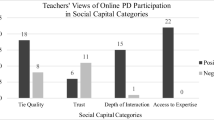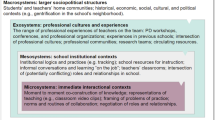Abstract
Teacher workshops attract teachers with common goals; they wish to improve their teaching practices and subject and information technology knowledge. The asynchronous online discussion is the main activity in teacher workshops. An analytical model was developed in this study to examine the temporal characteristics of collaborative knowledge construction in teacher workshops. Specifically, 664 posts were analyzed from an asynchronous online discussion—involving 91 teachers—on the topic, “How to Make a Language Course Interesting?” The aim of this paper is to present the changes in knowledge construction levels and teachers’ social interactive characteristics resulting from participation in teacher workshops. From the findings of this study, advances in theory, methodology and pedagogical practice are indicated. The findings also indicate that knowledge construction levels and teachers’ social interactive characteristics change at different stages of discussions. Suggestions for improving the effects of online teacher workshops are provided.




Similar content being viewed by others
References
Baek, S. I., & Kim, Y. M. (2015). Longitudinal analysis of online community dynamics. Industrial Management and Data Systems,115(4), 661–677. https://doi.org/10.1108/imds-09-2014-0266.
Baeten, M., Kyndt, E., Struyven, K., & Dochy, F. (2010). Using student-centered learning environments to stimulate deep approaches to learning: Factors encouraging or discouraging their effectiveness. Educational Research Review,5(3), 243–260. https://doi.org/10.1016/j.edurev.2010.06.001.
Barkley, E. F., & Major, C. H. (2005). Collaborative learning techniques: a handbook for college faculty. The Jossey-Bass Higher and Adult Education Series,56(4), 328–329. https://doi.org/10.1177/104515950301400412.
Borgatti, S. P., Everett, M. G., & Freeman, L. C. (2002). Ucinet for windows: Software for social network analysis. Harvard: Analytic Technologies.
Chieu, V. M., & Herbst, P. (2016). A study of the quality of interaction among participants in online animation-based conversations about mathematics teaching. Teaching and Teacher Education,57, 139–149. https://doi.org/10.1016/j.tate.2016.03.010.
Dillenbourg, P., Järvelä, S., & Fischer, F. (2009). The evolution of research on computer-supported collaborative learning: From design to orchestration. In N. Balacheff, S. Ludvigsen, T. Jong, et al. (Eds.), Technology enhanced learning: Principles and products (pp. 3–19). New York: Springer.
Dillenbourg, P., & Jermann, P. (2006). Designing integrative scripts. In F. Fischer, I. Kollar, H. Mandl, et al. (Eds.), Scripting computer-supported collaborative learning: Cognitive, computational and educational perspectives (pp. 275–301). New York: Springer.
Duncan-Howell, J. (2010). Teachers making connections: Online communities as a source of professional learning. British Journal of Educational Technology,41(2), 324–340. https://doi.org/10.1111/j.1467-8535.2009.00953.x.
Fosnot, C. T., & Perry, R. S. (2005). Constructivism: A psychological theory of learning. In C. T. Fosnot (Ed.), Constructivism: Theory, perspectives and practice (pp. 8–33). New York: Teacher College Press.
Gunawardena, C. N. (1995). Social presence theory and implications for interaction collaborative learning in computer conferences. International Journal of Educational Telecommunications,1, 147–166. https://doi.org/10.31274/etd-180810-507.
Hanushek, E. A., & Woessmann, L. (2010). The high cost of low educational performance: The Long-run economic impact of improving PISA outcomes. Paris: OECD Publishing.
Herrmann, K. J. (2013). The impact of cooperative learning on student engagement: Results from an intervention. Active Learning in Higher Education,14(3), 175–187.
Hill, A. G., Srinivasa, S., Hawken, S. J., Barrow, M., Farrell, S. E., & Hattie, J. (2012). Impact of a resident-as-teacher workshop on teaching behaviour of interns and learning outcomes of medical students. Journal of Graduate Medical Education,4(1), 34–41. https://doi.org/10.4300/jgme-d-11-00062.1.
Holmquist, P. O. (2015). Theorizing teaching and learning: Pre-service teachers’ theoretical awareness of learning. European Journal of Teacher Education,38(1), 102–118. https://doi.org/10.1080/02619768.2014.902437.
Ida, B. N. M. (2017). Promoting primary school teachers’ competence through dynamic interactive workshop and partnership. International Journal of Linguistics: Language and Culture,3(1), 1–5. https://doi.org/10.21744/ijllc.v3i1.335.
Keogh, E. (2005). Datamining and machine learning in time series database. In Proceedings of the 5th industrial conference on data mining.
Liesel, E., Tilda, L., Irma, E., & Ronél, F. (2015). In-service teacher training to provide psychosocial support and care in high-risk and high-need schools: School-based intervention partnerships. Journal of Education for Teaching,41(3), 267–284. https://doi.org/10.1080/02607476.2015.1044226.
Lin, S. (2004). The application of practice teaching model based on workshops. Modern Education Forum,3, 67–78.
Lin, S. Y., & Xie, Y. (2017). Effects of tag cloud-anchored group discussions on pre-service teachers’ collaborative knowledge construction. Australasian Journal of Educational Technology,33(2), 73–85. https://doi.org/10.14742/ajet.2885.
Loes, C. N., An, B. P., Saichaie, K., & Pascarella, E. T. (2017). Does collaborative learning influence persistence to the second year of college? Journal of Higher Education,88(1), 62–84. https://doi.org/10.1080/00221546.2016.1243942.
Lucas, R. I., Promentilla, M. A., Ubando, A., Tan, R. G., Aviso, K., & Yu, K. D. (2017). An AHP-based evaluation method for a teacher training workshop on information and communication technology. Evaluation and Program Planning,63, 93–100. https://doi.org/10.1016/j.evalprogplan.2017.04.002.
Matijević, M., Topolovčan, T., & Rajić, V. (2017). Teacher assessment related to the use of digital media and constructivist learning in primary and secondary education. Croatian Journal of Education,19(2), 563–603.
Muñiz-Rodríguez, L., Velázquez, P. A., Muñiz, L. J. R., & Valcke, M. (2016). Is there a gap in initial secondary mathematics teacher education in Spain compared to other countries? Revista De Educacion,372, 111–132.
Pea, R. D. (1993). Practices of distributed intelligence and designs for education. In G. Salomon (Ed.), Distributed cognitions (pp. 47–87). Cambridge: University Press.
Prichard, A., & Woollard, J. (2010). Psychology for the classroom: Constructivism and social learning. London: Routledge.
Rustaman, N. Y., Rusdiana, D., Efendi, R., & Liliawati, W. (2017). The workshop program on authentic assessment for science teachers. Journal of Physics Conference Series,812, 012062.
Sang, Y. C. (2017). The design, implementation, and evaluation of Korean k-12 teacher training workshops. Journal of the National Council of Less Commonly Taught Languages,21, 145–167.
Scott, J. (2012). What is social network analysis?. New York: Bloomsbury Academic.
Shankar, R., Orion, N., King, C., Warrier, A. K., Narahari, A. M., & Swamy, S. G. S. (2017). Teacher training workshops in India—A report. Journal of the Geological Society of India,89(2), 217–219.
Skrypnyk, O., Joksimovic, S., Kovanovic, V., Gasevic, D., & Dawson, S. (2015). Roles of course facilitators, learners, and technology in the flow of information of a cMOOC. International Review of Research in Open & Distance Learning,16(3), 188–217. https://doi.org/10.19173/irrodl.v16i3.2170.
Stahl, G. (2000). A model of collaborative knowledge building. In International conference of the learning sciences (Vol. 113, pp. 201–212). MIT Press.
Taylor, G. W., Fergus, R., Lecun, Y., & Bregler, C. (2010). Convolutional learning of spatiotemporal characteristics. In European conference on computer vision (Vol. 6316, pp. 140–153). Springer.
Thompson, L. M., Uyeda, K., Wright, J., & Halfon, N. (2005). Family support: Fostering leadership and partnership to improve access and quality (building state early comprehensive systems series, number 14). Los Angeles: National Centre for Infant and Early Childhood Health Policy.
Valtonen, T., Sointu, E., Kukkonen, J., Kontkanen, S., Lambert, M. C., & Mäkitalo-Siegl, K. (2017). TPACK updated to measure pre-service teachers’ twenty-first-century skills. Australasian Journal of Educational Technology,33(3), 15–31. https://doi.org/10.14742/ajet.3518.
Vuopala, E., Hyvönen, P., & Järvelä, S. (2016). Interaction forms in successful collaborative learning in virtual learning environments. Active Learning in Higher Education,17(1), 25–38. https://doi.org/10.1177/1469787415616730.
Wise, A. F., Zhao, Y., Hausknecht, S., & Chiu, M. M. (2014). Temporal considerations in analyzing and designing online discussions in education: examining duration, sequence, pace, and salience. Assessment and Evaluation of Time Factors in Online Teaching and Learning,2, 198–231. https://doi.org/10.4018/978-1-4666-4651-3.ch008.
Xie, K., & Ke, F. (2011). The role of students' motivation in peer-moderated asynchronous online discussions. British Journal of Educational Technology,42(6), 916–930. https://doi.org/10.1111/j.1467-8535.2010.01140.x.
Xie, K., Yu, C., & Bradshaw, A. C. (2014). Impacts of role assignment and participation in asynchronous discussions in college-level online classes. Internet and Higher Education,20(1), 10–19.
Yilmaz, K. (2008). Constructivism: Its theoretical underpinnings, variations, and implications for classroom instruction. Educational Horizons,86(3), 161–172.
Zhang, S., Liu, Q., Chen, W., Wang, Q., & Huang, Z. (2017). Interactive networks and social knowledge construction behavioral patterns in primary school teachers' online collaborative learning activities. Computers and Education,104, 1–17. https://doi.org/10.1016/j.compedu.2016.10.011.
Zhang, S., Liu, Q., & Xiong, J. (2015). Research on teacher workshop training model from the perspective of cognitive apprenticeship. China Educational Technology,8, 114–120.
Acknowledgements
This work was supported by Chinese Ministry of Education & China Mobile under Grant [Number: MCM20170502]; Chinese National Natural Science Foundation Project under Grant [Number: 71704062]; Department of Science and Technology of Hubei Province of China under Grant [Number: 2017ACA105].
Author information
Authors and Affiliations
Corresponding authors
Additional information
Publisher's Note
Springer Nature remains neutral with regard to jurisdictional claims in published maps and institutional affiliations.
Rights and permissions
About this article
Cite this article
Zhang, N., Liu, Q., Zhu, J. et al. Analysis of Temporal Characteristics of Collaborative Knowledge Construction in Teacher Workshops. Tech Know Learn 25, 323–336 (2020). https://doi.org/10.1007/s10758-019-09422-9
Published:
Issue Date:
DOI: https://doi.org/10.1007/s10758-019-09422-9




